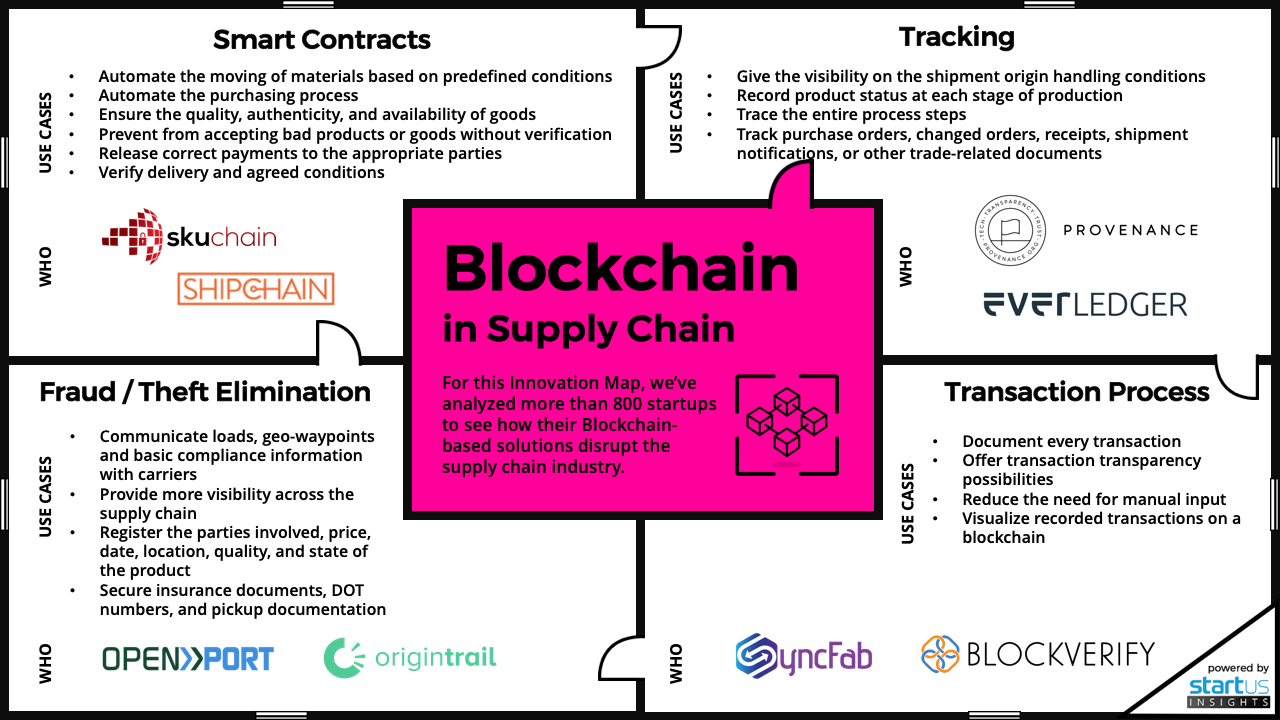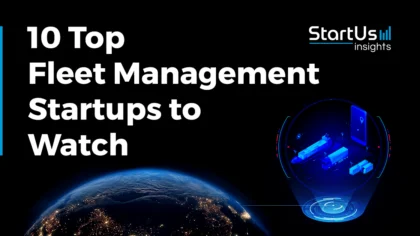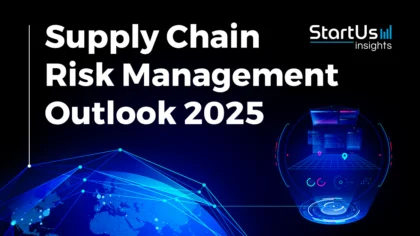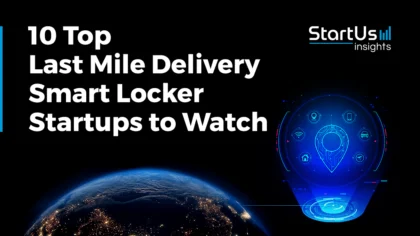Accelerate Productivity in 2025
Reignite Growth Despite the Global Slowdown
Key Takeaways
Here are some key takeaways of how blockchain changes the future of the supply chain industry:
- Fraud/Theft Elimination – Blockchain’s public ledger technology offers transparency and allows tracking the ownership history of various items such as diamonds, for example.
- Transaction Process – The technology’s traceability enables wholesalers to pinpoint a product’s exact origin, which can save lives in case of contamination and gives the consumer trust in return.
- Smart Contracts – Enabling the automation of the purchasing process as well as ensuring the quality, authenticity, and availability of goods.
- Tracking – Blockchain facilitates the tracking of purchase orders, changes orders, receipts, shipment notifications, or other trade-related documents.
Heat Map: Blockchain Startups Disrupting The Supply Chain Industry
Our team has created the Heat Map below to highlight the hotspots of blockchain startups disrupting the supply chain on a global level:
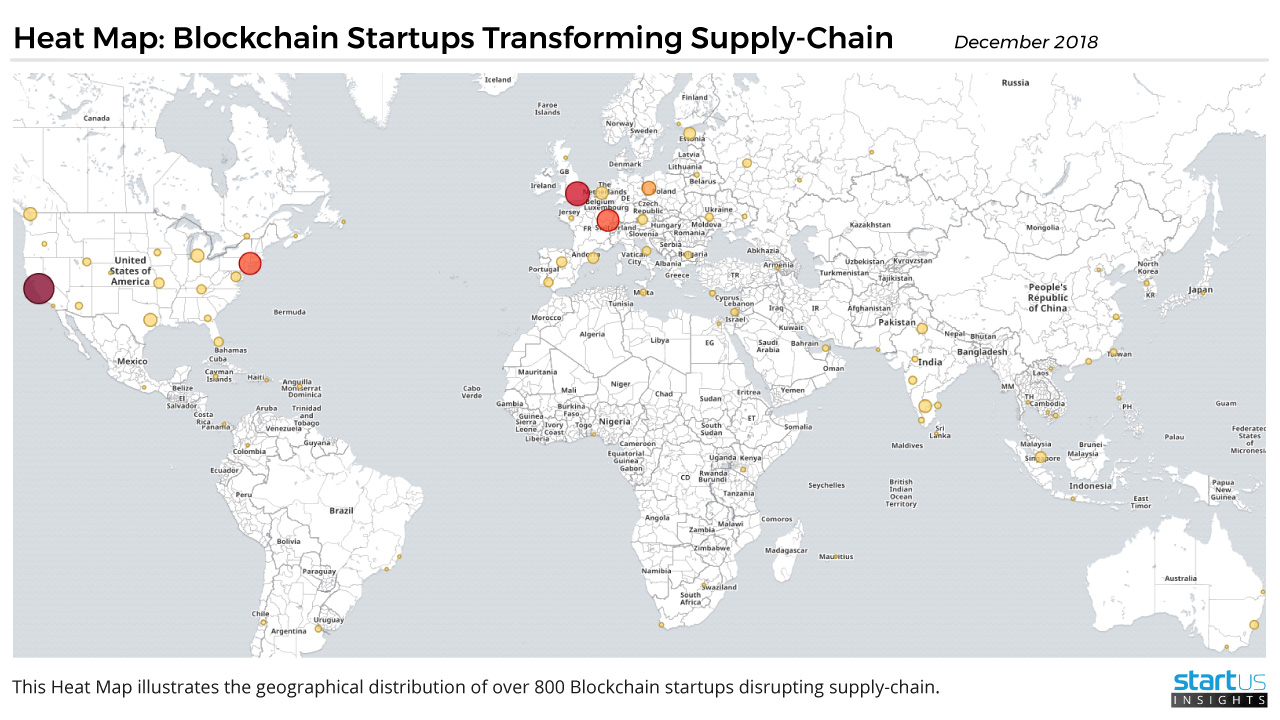
Click to enlarge
Global Distribution of Blockchain Startups in the Supply-Chain Sector (c) StartUs Insights
8 Blockchain Startups Transforming The Supply Chain Industry:
- Blockverify – A startup focusing on improving anti-counterfeit measures. Currently, the company verifies products, goods, merchandise, and transactions.
- Everledger – A blockchain startup that helps track the provenance of luxury items (like diamonds). Additionally, the startup assists in fraud and risk reduction.
- Openport – A mobile platform for enterprise supply chain management in emerging markets, directly connecting shippers and carriers in order to reduce cost, improve performance and drive continuous supply chain optimization via blockchain.
- Origintrail – A blockchain-powered data exchange protocol for interconnected supply chains.
- Provenance – An emerging blockchain company making information open and accessible all along the supply chain and at the point of sale.
- Shipchain – Blockchain-powered logistics and freight platform pursuing smart contract applications in the logistics industry.
- Skuchain – Applies the cryptographic principles developed in the Bitcoin network to security and visibility for the global supply chain.
- SyncFab: Available capacity, transparent order tracking, and purchase order management secured by blockchain.
Supply chain inefficiencies are increasing in complexity and hindering the development of the entire industry, including all the sectors of the economy that are intertwined with it, such as retail, manufacturing, and logistics.
Despite these issues, the supply chain management (SCM) market is expected to reach $19 billion in revenue by 2021 through the digitization of its operations, representing an important niche for blockchain innovations in the sector.
Innovation Map: How Blockchain Startups Transform The Supply Chain Sector
Our team of innovation analysts conducted thorough and extensive research on the potential of blockchain in the supply chain industry, encompassing over 800 startups working in the field.
Below, you’ll find the Innovation Map highlighting the most promising application areas as well as a deep dive in each of the sections.
Fraud/Theft Elimination
Today’s supply chain networks are full of logistical challenges, paperwork, and intricate operational procedures. This is especially true for high priced and valuable goods such as jewelry other luxury items (watches, handbags, etc.).
The niche is ready to fight product counterfeiting and other fraudulent activities considering the high marginal returns from the sale of such products. Transparency is where blockchain really raises the bar when it comes to supply chains, thanks to its public and decentralized nature.
Everledger, for example, is a blockchain startup that measures 40 data points that describe a diamond and records them on the blockchain. This allows any stakeholder to check whether a seller is the rightful owner of the gem and whether it is genuine and was rightfully mined.
Transaction Process
Determining a product’s origin can be an essential procedure in some cases. For food retailers/wholesalers it is critical to eliminate products that could potentially cause harm.
Back in 2016, Walmart chose to partner with IBM in developing a blockchain solution for tracking food items’ origins and quickly react when an accident occurs. Previously it took up to several weeks to determine where a certain grocery product came from, which is unacceptable in emergencies.
For the diamond industry, blockchain offers a similar use case as it enables buyers to determine whether a diamond was acquired in a legal manner or not.
Smart Contracts
Smart contracts enable organizations to handle large amounts of transactions automatically.
Supply chain, in particular, is negatively affected by long sales outstanding. The average U.S. Fortune 100 company has more than 60-day sales outstanding, despite the underlying credit contracts limiting it to 30 days. The primary rationale behind this is the fact that invoices are usually issued and processed by humans, who tend to either forget or delay payments for outstanding invoices, especially when under time pressure.
Blockchain-powered smart contracts are changing this, by including “programmable” clauses that allow for the invoices to be issued/processed once a set of conditions has been satisfied. For example, when a logistics company confirms the delivery of a certain product from the seller to the customer, the contract will trigger the invoice preparation on one side, and the payment for it on the other, without requiring a third-party intermediary, and thus speeding up the sales cycle.
Tracking
The interconnected supply chain and logistics industry are both subject to heavy regulations, especially when it comes to moving goods between countries and states (trucking, global ocean freight, etc.). In most cases, such logistical operations are accompanied by large amounts of paperwork, which are mainly processed manually.
For example, to ship refrigerated products from East Africa to Europe, one would have to obtain written approvals from nearly 30 organizations. All in all, the costs add up 15 to 50% of the total shipping costs. No wonder that global shipping companies to search for a better way to organize their operations, and blockchain is definitely one way to achieve that.
Maersk, for instance, partnered with IBM in 2015 to develop and implement a complex blockchain product, to service their enormous network of shippers and their daily operations and documentation in a bid to lower the shipping costs and transform their business model.
The development and tests are well underway, with first pilot projects operating since 2017. Notably, the solutions designed by IBM have not replaced existing IT structures, but rather enhanced them and were then built on top of legacy systems.
Conclusion
Supply chain, as well as logistics, is facing a serious need to be reformed. The importance of these sectors running efficiently are essential for almost any business, which creates the demand for them to constantly innovate and search for better solutions.
Blockchain and its decentralized publicly transparent nature offers an answer to many of the questions industry stakeholders face today. This includes the transparency of shipping processes, ease of paperwork and regulations, automatization of payments and contract terms, long sales cycle, the complexity of operations and more.
Given the rapid development of this technology, it has become a necessity to stay informed of the most recent developments in the field to stay ahead of your competition.

